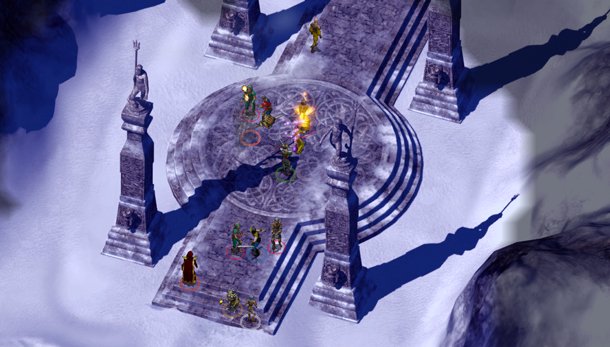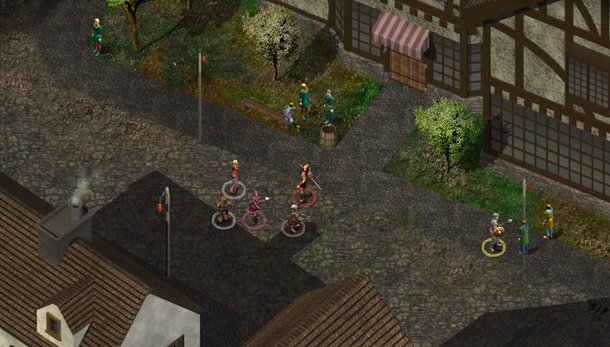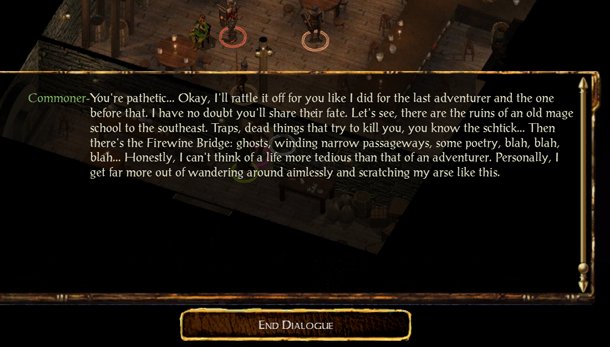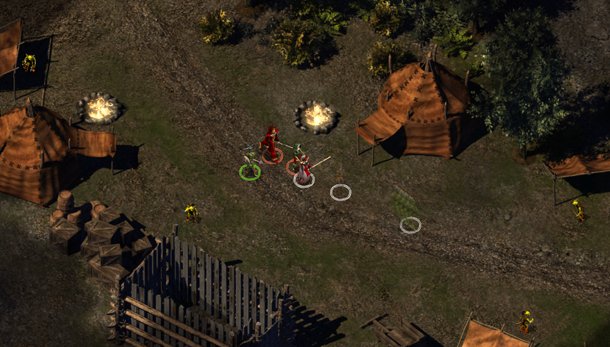Back to Baldur's Gate: Revisiting BioWare's legendary RPG
Where it all began.

This story was originally published in August, 2014. We're republishing it today to look back on the original before Baldur's Gate 3 gets its tentacles fully into our brains.
Baldur's Gate was one of my formative PC gaming experiences. I have vivid memories of sitting in the glow of my old CRT monitor on a Friday evening after school, dungeon crawling until the sun rose.
I've never been one for misty-eyed nostalgia, but last week I felt compelled to reinstall it. It was almost midnight, and I had work the next day, but I didn't think I'd be playing for long. Just enough to sate my nostalgia. Three hours later and I was still up. Its claws are in me again—almost 16 years after I first installed it on my old beige Pentium II—and, surprisingly, it still holds up.
Developed by BioWare in 1998, it's a vast fantasy RPG set in the Forgotten Realms, one of the most popular and long-running Dungeons & Dragons campaign settings. You create your own protagonist using a deep character editor, then embark on an adventure along the Sword Coast, a stretch of rocky coastlines, deep forests, ancient ruins, bustling cities, and labyrinthine dungeons.
There's a story to follow, but you can pursue it at your leisure. The world map is heaving with fun quests and memorable characters, and you get to decide whether you'll be a hero, a villain, or neither.
One of the most striking things about the game is how much personality it has. A lot of fantasy, especially in the D&D mould, suffers from being overly earnest and po-faced, but Baldur's Gate fizzes with character, and is often genuinely hilarious. Even a random commoner on the street might have something amusing to say, and I think almost half of the 15 or so hours I've sunk into this replay have been spent talking to the many thousands of NPCs who litter the Sword Coast.

As you explore you're constantly bumping into interesting characters, from eccentric oddballs and mad wizards to pompous lords and drunken dwarves. You even meet the legendary Drizzt Do'Urden at one point, who you can kill for his powerful scimitars and mithril armour if you're particularly skilled. The wealth of text in the game means there's a lot of reading, but it's all brilliantly written and wonderfully witty, never taking itself too seriously.
The biggest gaming news, reviews and hardware deals
Keep up to date with the most important stories and the best deals, as picked by the PC Gamer team.
There are 25 recruitable companions in the game, but unlike a lot of RPGs where characters will swear unfaltering allegiance to the hero regardless of their actions and goals, many of the characters in Baldur's Gate are fiercely independent. Minsc, of 'miniature giant space hamster' fame, will join your party upon the agreement you'll help him rescue his partner, Dynaheir. But linger too long without pursuing this quest and he'll go into a rage and attack you.
Similarly, characters will abandon the party if your reputation goes against their alignment. Noble deeds will disgust evil characters like irascible conjurer Edwin, while imperious paladin Ajantis will love you for it. This makes these characters feel like real people with their own goals and motivations, although it can be maddening when you're in the middle of a dungeon and one suddenly decides to ditch you.

The character sprites are pretty ugly, even by 1998 standards, but the pre-rendered backgrounds still look great. It's remarkable how atmospheric the game is, even now. Sound plays a big part in this, with chirping birds, booming thunder, and howling wind bringing the environments to life, not to mention Michael Hoenig's stirring orchestral score. BioWare's vision of Faerûn is still a joy to wander, and proof that you don't need modern graphics to create a rich, compelling game world.
There's a great feeling of relief when you escape from the rain-battered wilderness into the glow of a warm tavern, resting your weary bones before heading back out into the wild. You really feel like you're on an adventure, and thanks to an infamously steep difficulty curve, every foray into the unknown feels dangerous. All it takes is one unlucky critical roll to lose a party member.
In a lot of ways, Baldur's Gate feels incredibly archaic. The bloated interface and incessant item and character management mean you spend a lot of time shifting items around and selling things to merchants. But I actually love this, as time-consuming as it is, because I appreciate having full control over my party. That is, in fact, one of the reasons I love the game so much: How little hand-holding there is. You always feel like you're in control of your protagonist's destiny, not just following a prescribed path—even though the story is totally linear.

You can be a saint or a total dick. You can agree to help a farmer find his missing son while sending Imoen into his house to rob him. You can devote your life to defending truth and justice, or screw people over to fill your pockets. It's a role-playing game in the truest sense, offering not just good and evil paths, but all the grey areas in between.
If, like me, you feel the urge to return to Baldur's Gate, you can buy the Enhanced Edition, which comes with additional companions, new quests, and an arena battle mode.
The difficulty and cost of making a game as big, complex, and freeform as Baldur's Gate with modern production values means we'll likely never see a game like it again from BioWare, but with Obsidian's Pillars of Eternity and Larian's superb Divinity: Original Sin, the CRPG seems to be in the throes of a magnificent and unexpected comeback. Going back to Baldur's Gate, where it all began, has only made me more excited about its resurgence.
If it’s set in space, Andy will probably write about it. He loves sci-fi, adventure games, taking screenshots, Twin Peaks, weird sims, Alien: Isolation, and anything with a good story.


